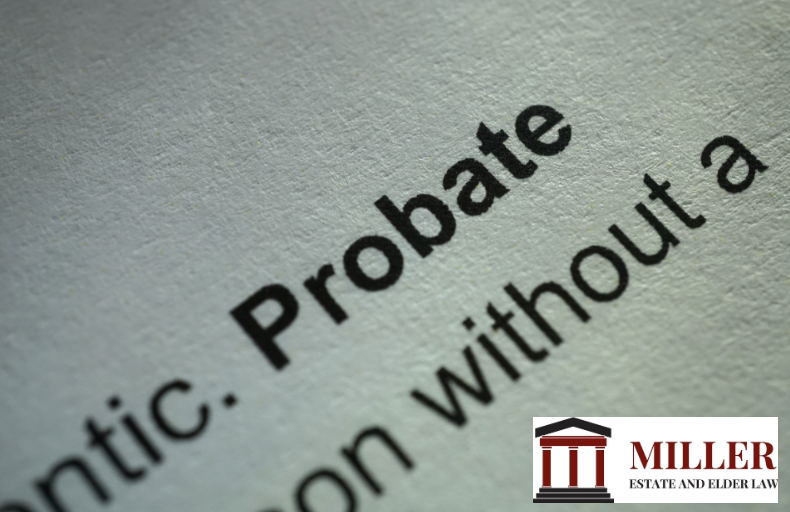
by Bill Miller | Jan 25, 2021 | Blog, Elder Law, Estate Planning, Probate
If there were ever a year to buckle up and learn a little bit about estate planning, this is it. After all, while 2020 is behind us and hope is on the horizon the Covid-19 pandemic has made it amply clear that the future is uncertain and preparedness is the best defense. Estate planning plays a part in this. Not only does having a plan protect your hard-earned assets from avoidable taxes, aggressive creditors, and potential reckless spending by heirs, it also ensures your loved ones are spared the cost and burden of probate court should the unthinkable happen.
What Is Probate?
Probate is the state-run, court-sponsored process of authenticating a person’s last will and testament. It is the place that evaluates a passed loved one’s assets, pays their final bills and taxes, and distributes what is left over to beneficiaries. As simple as this all sounds, the reality is a minefield of contentious family decisions, legal costs, and changing legislation. Each state determines their own probate laws and they are subject to regular update and so attempting to administer probate yourself or with the help of an automated service is a gamble of both resources and time.
An experienced probate attorney can help you avoid all of this but the financial cost is often greater than organizing an estate plan and the emotional burden is untold.
Avoiding Probate
Hassle and associated fees are not the only reason to avoid probate; for some, they are not even the main reason. While awaiting probate, your heirs will not see a penny and may not have access to your accounts. They will need to pull from their own pockets to cover not only court costs, but property insurance, taxes and even storage fees until probate is officially opened. In present times, when so many peoples’ finances are already stretched to the limit, this can be devastating.
Another reason to skirt probate is that records are public and available to anyone to view. You would not want your bank balances shared openly while living and there is no reason you would want otherwise once you have passed on.
In addition to expediting the process and saving on the cost of distributing your assets, an estate plan that avoids probate is also private. It keeps everything in the family, literally.
The first step to getting an estate plan off the ground is to list all you own and organize a family meeting. Once you have addressed the delicate subject of inheritances and chatted about who might serve as executor, financial power of attorney, and medical power, the next step is to reach out to a trusted and experienced estate planning lawyer.
Your attorney, guided by your goals and wishes, ensures the rest is easy. In less time than you think and at a fraction of both the financial and emotional cost of probate, you’ll have your affairs in order and you’ll move on to living your life secure in the knowledge that at least one of the future’s big uncertainties no longer looms on the horizon.
To see how we can help you contact Miller Estate and Elder Law today!. You can also simply call us at 256-472-1900. Talk to you soon!

by Bill Miller | Jan 6, 2021 | Blog, Elder Law, Estate Planning
Unless you are familiar with Tony Hsieh and his business approach, the connection between shoes and asset management might not seem obvious. Indeed, even if you do know a thing or two about the late former CEO of Zappos, you still might fail to see the connection. After all, what does your life’s work have to do with your footwear? Unless you have blown your savings into collector kicks, the truth is not much; however, if you are talking about the common ground between running a successful shoe enterprise and a successful estate and elder law firm, then the similarities are plenty.
Tony, who passed away tragically in late November founded the internationally-recognized online shoe retailer Zappos and in so doing left a legacy that can be counted not only in dollar signs, but in the much richer currency of human happiness. This is because Zappos is an outlier in the world of online retail. The company runs on ten core values which all, in some form or other, exist to ensure customers, as well as employees, vendors, shareholders and the community all leave any interaction with Zappos feeling happy. These values are the following:
- Deliver WOW Through Customer Service
- Embrace and Drive Change
- Create Fun and A Little Weirdness
- Be Adventurous, Creative, and Open-Minded
- Pursue Growth and Learning
- Build Open and Honest Relationships with Communication
- Build a Positive Team and Family Spirit
- Do More with Less
- Be Passionate and Determined
- Be Humble
Notably, nothing about shoes appears and there is not a single mention of profits. This is because, as the title of Tony’s book Delivering Happiness: A Path to Profits, Passion, and Purpose would indicate, happiness is profit, as well as so much more.
The lesson to be learned from Zappos applies at least as much to estate and elder law as to online retail. After all, an estate plan is only successful if one, it provides peace of mind to the person for whom it is prepared and two, eases the burden upon their family when they pass. These outcomes, peace and ease, are cousins of happiness and the cornerstone of a successful practice. When they are lost from sight, so too is an estate and elder law firm’s raison d’être.
Here at Miller Estate and Elder Law we take this to heart. Your happiness, as well as that of everyone involved in our operation, is fundamental. This is because when you leave our office, you do not leave with anything—not even a new pair of shoes—if you do not leave happy. Sure, we might secure your assets for future generations, ensure you have access to the care you need in old age, and help you in making the most of your life’s work (among many other services), but none of that is worth a great deal if you do not feel good doing it. Money and security mean little without well-being, after all.
In sharing this reflection, our goal has been to offer some insight into our practice. If you are reading this and happen to be a current or former client, hopefully all that has been said rings true. Whether this be the case or not, it would mean a lot if you could drop us a review on Google and AVVO. Reviews, both positive and negative, help us do a better job of helping you but more than that, they help other folks out there find services that are invested not only in raking in profits, but in nurturing happiness and building connection. Thank you!
If you would like to know how we can help with your estate plan, contact us today. You can also call 256-472-1900 to set up a consultation.

by Bill Miller | Apr 6, 2020 | Blog, Estate Planning, Long-Term Care
Long-term care, should you require it as you age, is a significant expense. Depending on where you live, the cost of a skilled nursing home can be well over $100,000 a year or more, and this is for a semi-private room. Medicare only pays under certain circumstances and in limited amounts, which surprises most Older Americans and their loved ones to learn. Further, if you have savings and investments, you might not qualify for the public benefits programs that can help you pay for the care you need such as the Alabama Medicaid program.
If you have not thought too much about long-term care, you are certainly not alone. Even if you are well-off enough to think you do not really need to put money aside for such costs, you do not know what is going to happen in the future, and most families cannot accurately predict how much it is going to cost.
A study published by the Department of Health and Human Services shares that 48 percent of all Americans over the age of 65 will need long-term care outside the home for up to one year. Nineteen percent will need it for up to 24 months, and more than 21 percent between two and five years.
For most of us, we want to create an estate plan that is focused on two main aspects:
- Lifetime protection, which safeguards you and your assets should you be in a crisis and need a decision maker with legal authority to act.
- Creating a legacy that will live on with your family members after you pass.
There are many ways you can start to address long-term care needs in your estate plan when you work with an elder law attorney. Your elder law attorney can provide a comprehensive strategy that addresses all of your health and legal needs, assuring you of the best possible care and protection should you need it. Long-term care planning can be incorporated into your overall estate plan so that it includes lifetime protections that contemplate a potential need for custodial care when you discuss your concerns with your attorney.
When we are healthy and in our prime, we do not often think about the big “what ifs.” Long-term care, as well as the threat of critical illness, is generally the last thing on our minds, even if we already have an estate plan in place. Most people think of estate planning as something that settles your affairs after you are gone, but know that it can also help you live better in life. Estate plans that consider long-term care will protect your assets and can ensure your legacy is intact should you need to be in a nursing home for any length of time.
We know this blog may raise more questions than it answers. Do not wait to contact our law practice to schedule a meeting to discuss your concerns today, or any time in the future.

by Bill Miller | Feb 2, 2020 | Blog, Estate Planning
An estate plan protects your family. It is not just for rich people. Everyone should have an estate plan in place to protect themselves, their businesses, their spouses, as well as their minor children or disabled children. Your estate plan needs to be in place as soon as possible to ensure your estate assets can go to the people you want them to go to in the event of your death.
While none of us want to consider a time when we will no longer be here to provide for our loved ones, we need to think about this as soon as possible. Estate planning can take many actions that protect your loved ones, and you. For example, through trust based estate planning, you can prevent irresponsible children from spending everything they inherit as soon as they get it. Another example allows you to potentially prevent family infighting after your passing by creating an estate plan that has your assets managed by an experienced guardian or trustee. Further, you can create an estate plan that will provide for and protect your minor children until they reach an age of your choosing.
The ultimate is for you to be able to create legal planning that can allow you to protect and care for loved ones long after you are gone. It often helps our clients to understand what happens in estate planning when they pass away. Let us give you more information right here. In almost all situations, after you die, a trustee or personal representative collects your remaining assets, pays your final bills and taxes, and retains the remaining assets for distribution according to the instructions contained in your last will and testament or trust agreement.
While last will and testaments are effective at handling relatively simple situations, trusts are much more flexible. For instance, trusts can be used if there is a minor child or disabled person left behind. The trust can name a trustee who has the authority to manage your assets and spend money on things necessary for the beneficiary’s absolute needs. The terms of the trust can state that the trust assets cannot otherwise be spent. It can also determine the age and circumstances for distribution, and guidelines for management of assets held within it.
Unfortunately, many people mistakenly believe that assets held in revocable trust agreements, which are created for estate planning purposes, will not be available for long-term care. This is almost never true. If a beneficiary is allowed to access trust assets, then the trust assets can be used to pay for the beneficiary’s long-term care. If you are concerned about a future that includes a need for long-term care, which we should all contemplate, then we need consider other planning alternatives.
One of the only ways to protect the trust assets from being used for long-term care is through an irrevocable trust agreement. This type of trust does not allow the beneficiary to access the trust assets. He or she only receives the type of distributions outlined in the trust document. An example of a type of such a protected irrevocable trust would be a special needs trust. Such a trust can insure that the government benefits for the disabled will also be available. Be careful, however, because if assets are transferred to an irrevocable trust, there is a five-year waiting period before the trust assets will be considered protected from long-term care expenses.
We know this article may raise more questions than it answers. For example you may ask yourself, how do you effectively plan for yourself and your loved ones when it comes to both estate planning and elder law concerns? We encourage you not to wait to get your questions answered by attorney Bill Miller in a consultation in our practice.

by Bill Miller | Jan 30, 2020 | Asset Protection, Blog, Estate Planning, trust
Revocable living trusts are very common today. They are known as a flexible way to manage your assets and a way to avoid probate. However, there are other little known facts about revocable trusts that you may need to know. As you develop your estate plan, consider adding a revocable trust.
Revocable Trusts Can Be Funded with Almost Any Asset
Once a trust document is signed, the grantor needs to transfer property to the trust. This is called funding the trust. Many people assume cash or real estate are the only assets that can be used to fund a trust.
However, the ownership of just about any asset can be transferred to a revocable trust. Along with cash and real estate, the grantor can transfer jewelry, art collections, boats, cars, business interests, and investments. Talk to your attorney before transferring assets. Some property can be passed to your heirs through other means, like beneficiary designations and joint property ownership.
Only Very Wealthy People Benefit from Revocable Trusts
This statement may be one of the primary reasons people don’t talk to an attorney about revocable trusts. Actually, revocable trusts are useful to people of modest means. Some of the more common reasons to form a revocable trust include:
- Incapacity Planning – If you become incapacitated while serving as trustee, your successor trustee can take over immediately. There’s usually no need for a conservatorship.
- Protecting Your Children – Maybe your children are minors and cannot inherit directly or perhaps one of the kids cannot be trusted with a lump sum inheritance. A revocable trust can dole out the inheritance in smaller payments. In addition, you can give the trustee the ability to pay an adult child’s bills instead of handing over cash.
A Revocable Trust Usually Remains Private
When you file a Will, it becomes a public record that anyone can view. The same is true for most documents filed in a probate case.
However, a revocable trust typically does not have to be filed with the Court. As such, the contents of your trust should be kept confidential. One exception that could cause your trust to go public is if someone files a lawsuit involving your trust. Even then, it might be possible to shield some or all of the details from public scrutiny.
Find Out More About Revocable Trusts
Often, people think they will not get any benefit from a trust. However, many of those same people would be amazed to learn how revocable trusts help people every day.
The attorneys at Miller Estate and Elder Law help their clients make informed, thoughtful decisions. Contact Bill Miller at 256-251-2137 to schedule an appointment. Though our office is now located at 818 Leighton Avenue in Anniston, we serve clients in Gadsden, Hoover, Talladega, Vestavia Hills, and surrounding areas.
Also, check out the free legal resources on our website!

by Bill Miller | Oct 21, 2019 | Estate Planning
When did you last review your estate planning documents? If you prepared a complete plan, you probably signed a Will, a durable power of attorney, and an advanced directive. However, maybe you signed all these documents years ago and you don’t know if they still fit your lifestyle. Read on to learn the 3.5 reasons to change your estate plan.
Reason #1: Your Finances Have Changed
Estate planning strategies vary depending on your estate’s value. If your net worth has decreased or, hopefully, increased substantially since your last estate plan review, review your plan with your estate planning attorney.
Reason #2: Your Family Structure Has Changed
Major life events typically trigger a good ol’ estate plan review. Marriages, divorces, births, and death – they all dramatically alter your family. It’s likely your estate planning goals are different, too. For example, the birth of a new grandchild might get you started thinking about college savings plans or even just adding the newborn to your Will or trust.
Keep in mind that it is not only your Will that might need some alterations. For example, if you are divorced, did you name your spouse or in-laws as agents or personal representatives in your durable power of attorney or advanced directive? If so, it may be time to name new ones.
Reason #3: You Haven’t Reviewed Your Plan in a Long Time.
Even someone with a fairly simple, ordinary, easygoing life faces triumphs and trials. It’s likely that your life right now is not the same as it was a year ago . . . or five years ago . . . and so on. Has your estate plan kept up with your life?
Reason #3.5: The Tax Man
Okay, this is only a .5 for a good reason: most of us will not need to escape the federal estate tax burden. However, this does not mean that you should ignore estate, gift, and income tax consequences of your plan:
- Tax laws could change, making your plan out-of-date.
- Watch for state estate tax and inheritance tax if you own property in another state.
- If your estate will even come close to the federal estate tax exclusion of $11.18 million per person, adjust your estate plan accordingly.
- So, pay attention, review your plan for tax issues, and watch for tax laws to change.
There’s No Time Like the Present. If you have not reviewed your plan in many years, this is the time.
Make an appointment to have your estate plan reviewed or to finally have a new plan prepared.
The attorneys at Miller Estate and Elder Law understand the estate planning needs of their clients. Contact Bill Miller at 256-251-2137 to schedule an appointment. Though our office is now located at 818 Leighton Avenue in Anniston, we serve clients in Gadsden, Hoover, Talladega, Vestavia Hills, and surrounding areas.
Check out our website for information and free resources.





